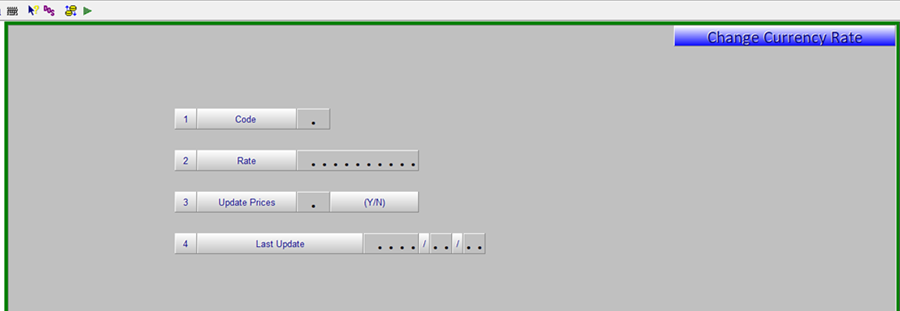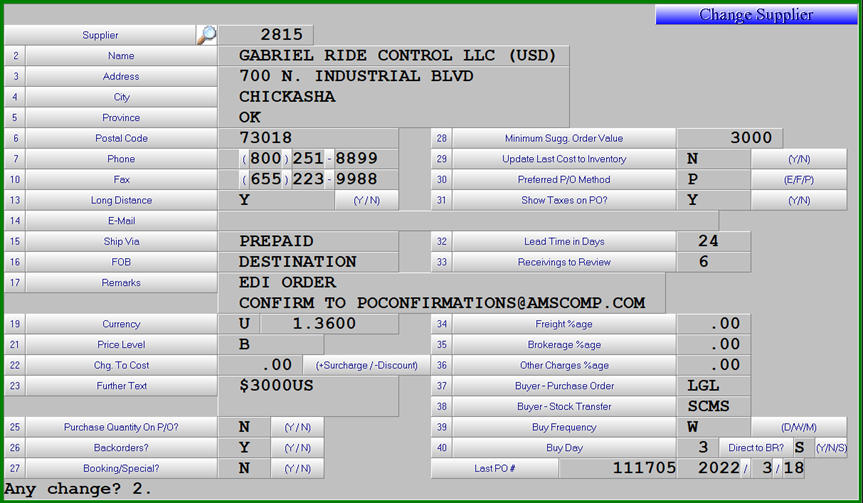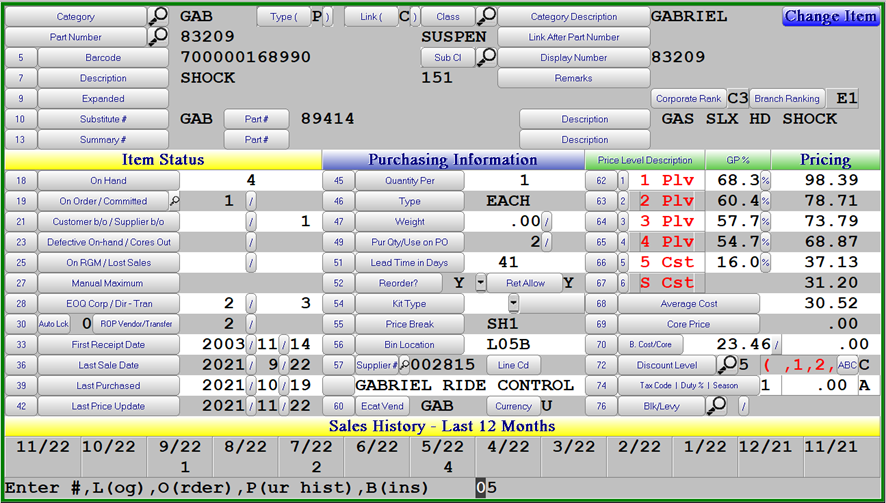Foreign Currency
Foreign Currency
Purchases made outside Canada can be purchased in the foreign countries’ currency
In addition to the currency enhancement, three additional fields allow the system to roll into the average cost @ the time of Purchase Order Receipt, Freight, Brokerage and Additional Costs. These values can be entered as part of the PO receiving or as a default % in the Supplier Maintenance screen. In addition, where Duty is applicable @ the part level, this cost rolls up as a part of the cost
Default GL Accounts
System Utilities à> System Set-up à> Purchasing à> Parameter Maintenance à> Screen 3 S/O Defaults and Smoothing
System Utilities a> System Set-up à> Purchasing à> Parameter Maintenance à> Screen 2 System Configuration
All values posted into the GL are in Canadian dollars
* Note; eachEach branch has to have GL codes amended @ the Branch level
Foreign Exchange Rate
Purchasing à> Data Maintenance à> Currency

Foreign Exchange Rates are a global setting and can be added or changed in this screen. This can also be used where there is an uplift from the supplier or additional changes are incurred such as freight. Adding a currency code other than “C” with an exchange rate of 1.0000 and assigning supplier to this code allows for updating of P6 cost and selling prices based on the base cost allowing purchase orders to be issued with the accurate supplier cost.
Fields:
Fields
1 – Code = Currency
2 – Rate = Exchange Rate
3 – Update Prices = If the currency rate has changed this should be set to Y if you want to update the selling prices based on the new rate.
NOTE: The automatic price update for currency rate changes is typically scheduled to run weekly on Sundays.
4 – Last Update = Date that prices were last updated for this currency rate based on a change in Currency Rate
Supplier Set-Up
Purchasing à> Data Maintenance à> Supplier

While the Exchange Rate is global the Supplier Maintenance screen is where you select the currency you are going to buy in.
Fields:
Fields
19 – Currency; select currency
21 – Price Level = Base; the field in the Inventory Maintenance screen the supplier’s price is displayed from their price list
- Enter “B” in this field for all foreign exchange suppliers
29 – Update Last Cost to Inventory Y/N; at time of PO receipt “Y” will update Canadian selling prices “N” will not update selling prices but average price is updated.
34 – Freight Percentage: is a default percentage for freight costs.
35 – Brokerage Percentage: is a default percentage for brokerage fees
36 – Other Charges; any additional costs such as a pallet cost or insurance
Note: These default costs are applied to all parts received from the supplier in the calculation of the landed cost to update average cost and when Canadian cost [Price 6] and selling prices are calculated during the Base Cost update/
Inventory Maintenance Screen
Inventory Data Maintenance à> Master File à> Product Master
Fields:
Fields
Base Cost/Core – Suppliers cost and core price in their currency from price file
Tax Code | Duty % | Season – Part tax code | duty % for the part which is applied into the landed cost of the goods at the time of PO receipt and when Canadian prices are calculated.
Purchase Order
Foreign purchase orders will print with the supplier’s base cost
Purchase Order Receipt
Purchasing à Purchase Order Receipt à PO Receipts Input
Fields:
Currency – the currency the purchase order was created in and the current exchange rate for that currency.
Price Level – relating to the Supplier, “B” = Base Price
Freight – freight costs are entered here, are spread evenly across all SKU’s on the purchase order and are in CDN dollars
Brokerage – brokerage costs are entered here, are spread evenly across all SKU’s on the purchase order and are in CDN dollars
Other Costs – any other cost associated with the acquisition of the PO can be entered here and are spread evenly across all SKU’s on the purchase order and are in CDN dollars
Note: If these values are left blank the percentages assigned to the supplier, if any, will be used to calculate approximate costs.
PO Receipts Journal
The PO Receipts journal will include these additional costs
